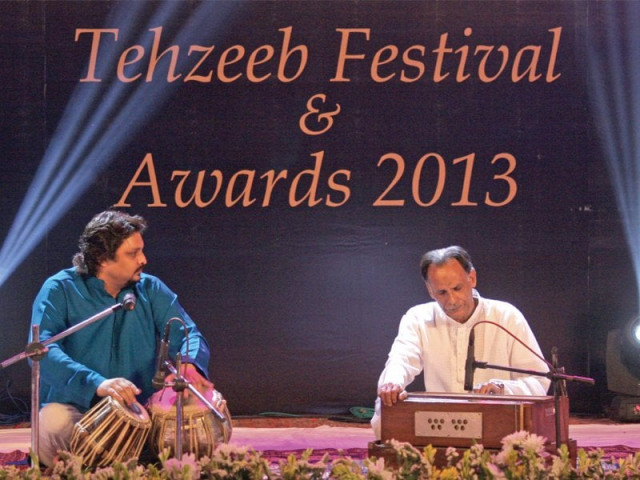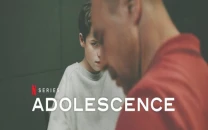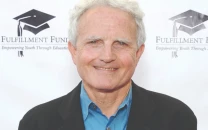Tehzeeb Festival 2013: Classical music at its very best
The night witnessed a melodic combination of tablas, banjos and ustads.

The night witnessed a melodic combination of tablas, banjos and ustads. DESIGN: SAMRA AAMIR
Hats off to Malahat and Sharif Awan of the Tehzeeb Foundation. In an attempt to take us back to our musical roots in the subcontinent, the couple has exhumed and disinterred styles and approaches from one of the oldest and most sophisticated systems of music in the world. Every annual musical function hosted by them has been tasteful and refined; and the programme on the second day of the festival, held at the Marriott Hotel on June 28, was simply dripping with jewels. The couple has a special knack for selecting the pick of the bunch — and the best there is.
The music of South East Asia is melodic, as opposed to Western classical music which is harmonic — an important difference which gives desi music its distinctive character. There are also differences in the percussion department where two separate tablas might be struck at different tempi — within the same time frame. This is rare, but it can happen. In this genre, the closest comparison to the Western musical tradition can be found in the compositions of the early African slaves in the deep South and Cuba, where they spoke to the gods through their drums.

The programme was kicked off by Mumtaz Sabzal on the modified banjo. One would never have guessed that this instrument was once part of Minstrelsy in the Jazz tradition, an important chapter in the 300-year old blending in the United States of the music of Europe and West Africa. Sabzal was absolutely delightful in the Raag Kirwani as he stroked and caressed the melody and set the tone for the evening’s entertainment. The Ahang-e-Khusro, the first of the two vocal offerings, was presented by Ustads Naseeruddin Saami and Urooj Naseer with Ustad Bashir Khan on the tabla. I don’t know what the Awans have been feeding this tabla player. He was there, performing in every number except the last one, exuding a contagious and desperate energy. He was totally focused, alert and sensitive to the music’s nooks and crannies, never putting a finger wrong. Sami and Naseer, with their throaty intensity, commanded an absolute stillness in the audience.
I have always been impressed by the virtuoso on the sitar, Rais Khan of the Mewati Gharana, who invariably makes a rather regal entrance. The sitar, like the Spanish steel guitar, is a wonderful instrument. By stretching a wire, one can alter the tone to dissolve into a melancholic fugue. And by a warm flourish, the instrument can produce a string of descending quavers similar to harp-like arpeggios. At the Marriott, Rais Khan and his son were in sumptuous form and gave scintillating examples of both moods. Rais has lost none of his old magic as he alternated with his son Farhan in some highly imaginative and intricate finger work. I was greatly impressed by the lad who couldn’t have had a better teacher.
Ustad Fateh Ali Khan and Rustam Fateh Ali Khan provided the hard core element. I have always noticed a heavy air of foreboding in the Patiala Gayeki. There’s much gritting of teeth and knuckle clenching and also a great deal of looking into the distance. I marveled at the breath control, their grip on the words and the awe-inspiring conviction with which they captured the tone of the composition. Ustad Altaf Hussain Tafoo Khan concluded the evening’s programme with a tabla solo he demonstrated a hundred different ways in which to flay a tabla and a drum. At times it appeared the hands were working independent of each. Who knows? Perhaps they were.
Published in The Express Tribune, July 01st, 2013.
Like Life & Style on Facebook, follow @ETLifeandStyle on Twitter for the latest in fashion, gossip and entertainment.



















COMMENTS
Comments are moderated and generally will be posted if they are on-topic and not abusive.
For more information, please see our Comments FAQ